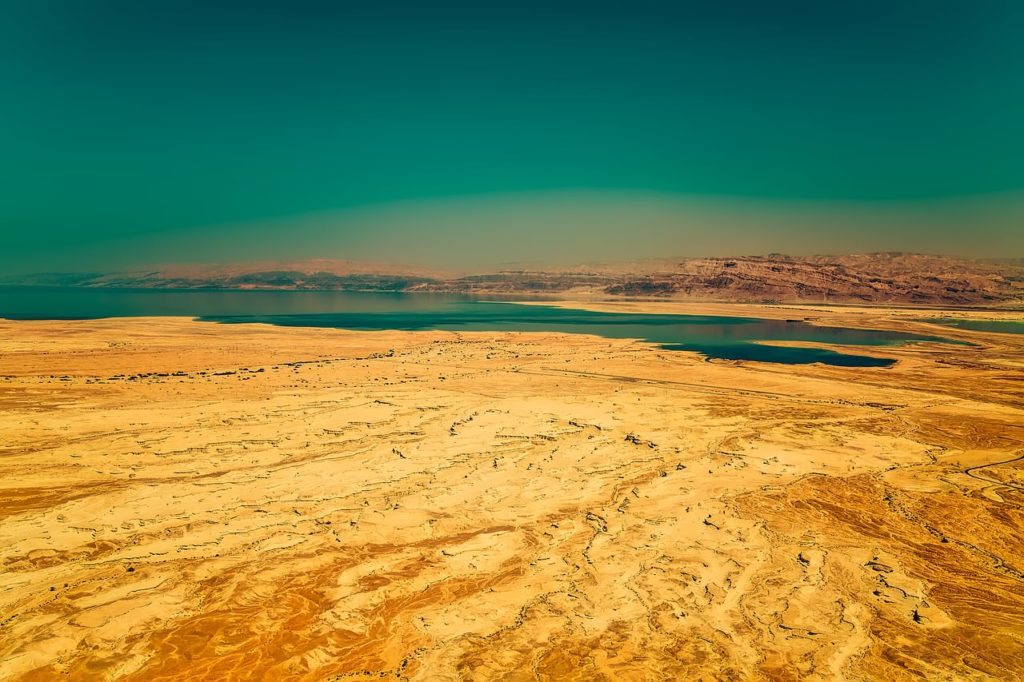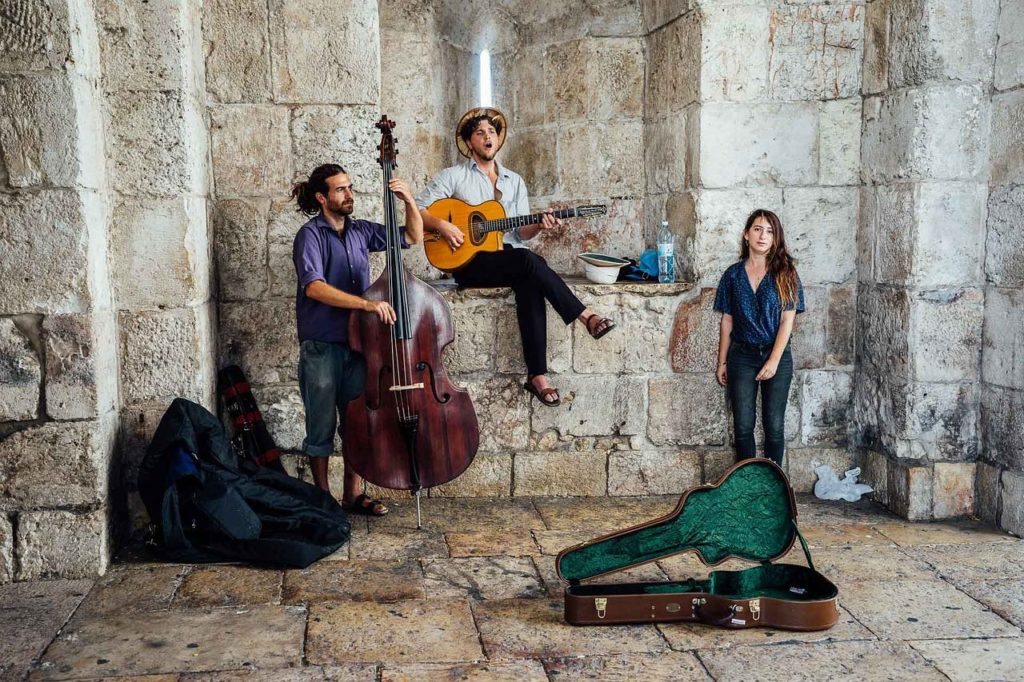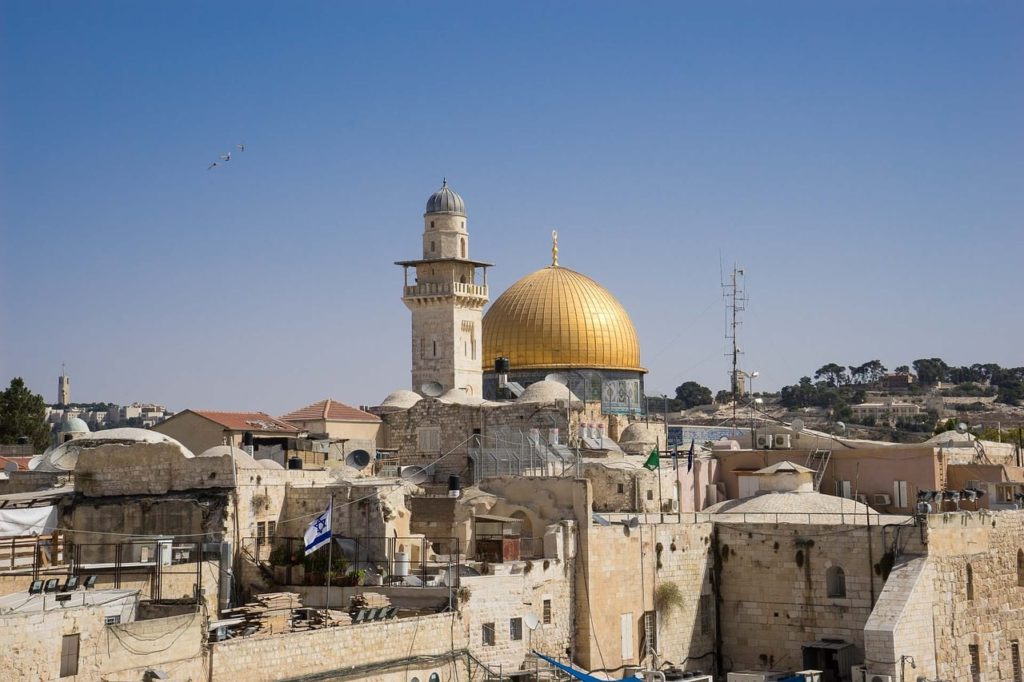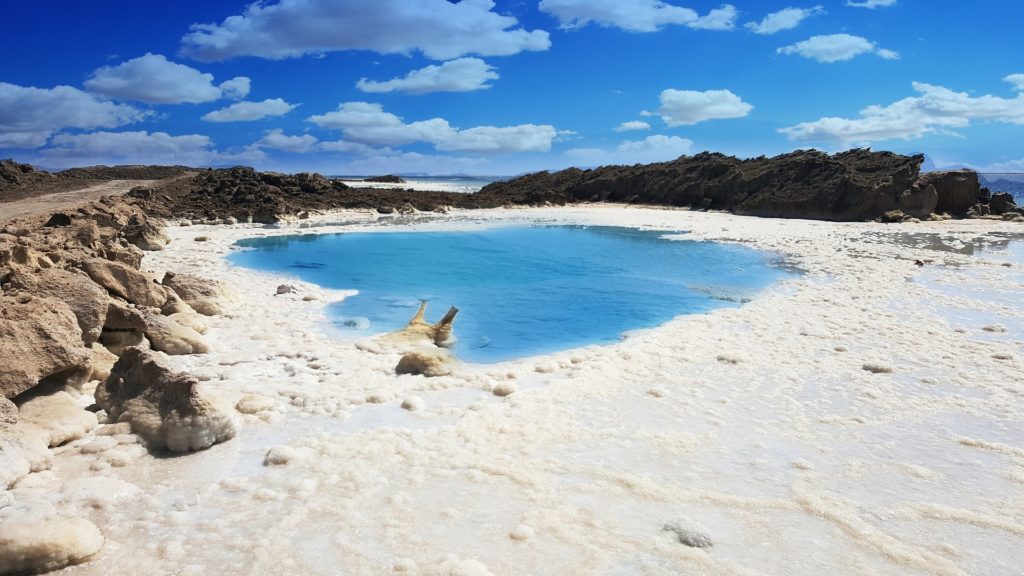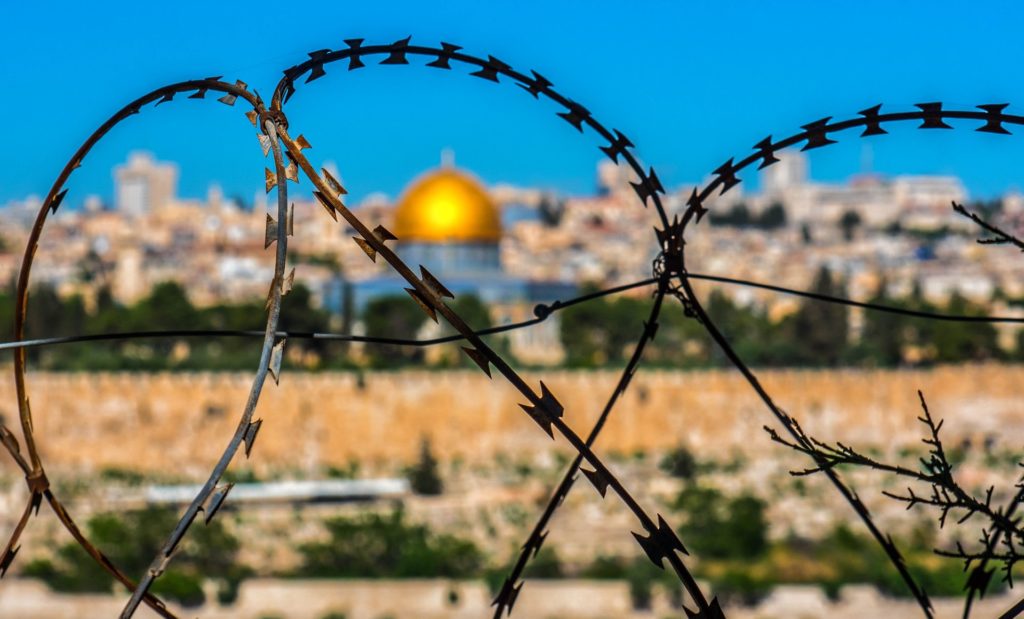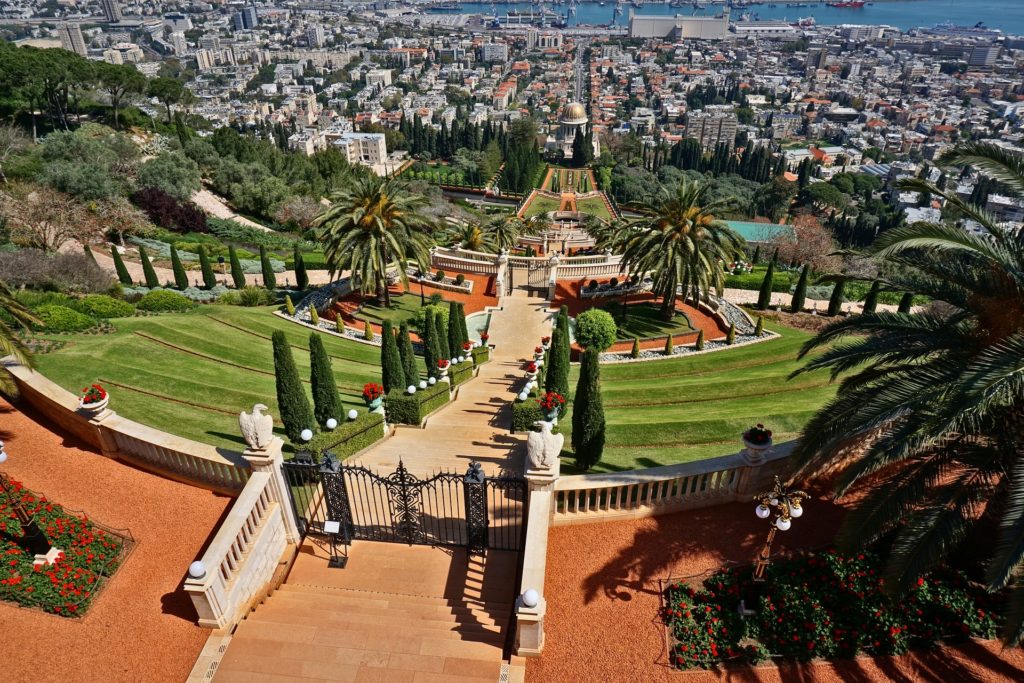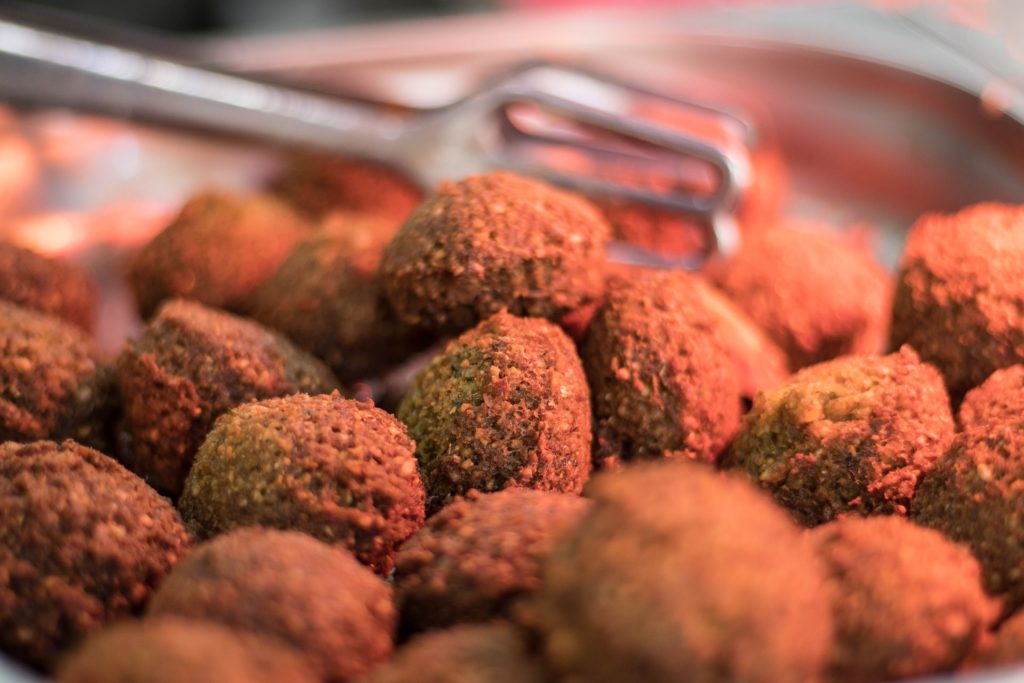Backpacking in Israel
You don’t have to be religious to be fascinated by the Holy Land: The eventful history of the Jewish people and ultimately of the entire region has a very special attraction for many people. The interest in backpacking in Israel is correspondingly high.
It is not only the cultural and historical wealth that makes Israel such an attractive travel destination. Also scenically the small country is extraordinarily versatile and worth seeing. Roughly speaking, there are about four regions: the Negev Desert and the Jordan Valley in the south, the hilly central country and the coastal strip. The Dead Sea, which lies in the border area with Jordan, is also famous.
Israel: Politics and Economy
The present state of Israel is still very young: it was only founded in 1948. Efforts to establish a sovereign Jewish state, however, have been underway since the 19th century. Even before the founding of the state, there were increased migratory movements into the territory of the present-day state of Israel. This was also related to a long smouldering anti-Semitism in Europe, which reached its tragic peak under the National Socialists between 1933 and 1945.
Today’s national territory lies roughly on the territory of the historical kingdoms of Israel and Judah. The region has been inhabited by different ethnic groups for thousands of years. Between about 1000 BC and 300 AD Jewish culture dominated the region, then became a centre of Christianity and finally predominantly Muslim. These historical developments form the background for the ongoing conflict in the region.
Despite the Middle East crisis, Israel’s economy is extremely strong. After all, the country, which has only about 8 million inhabitants, ranked 36th on the list of national economies measured by gross domestic product (2014). The unemployment rate has been falling steadily since 2004 and currently stands at around 4%. At the same time, a strong demand for skilled workers is causing wages to rise. (Further information on Israel’s economy can also be found at the OECD.)
Israel is one of the most highly developed industrial nations, and rightly so. In the Middle East, Israel is also the country with the highest standard of living. Israel enjoys an excellent reputation worldwide, especially in terms of medical care and medical research. The strongest economic sectors are the military, finance and technology – here, too, Israel is a global leader in some areas.
Culture in Israel
Of course, everyday life in Israel is strongly influenced by the smouldering conflict over the Palestinian territories. Nevertheless, the country offers travellers above all fascinating insights into Jewish culture – today about 43% of all Jews live in Israel – but also into an overall varied and rich history with various ethnic and religious influences. Last but not least, Christianity also has its origins here, and Arab influences can be seen everywhere.
Politically, however, the population growth of the Jewish population has absolute priority; the growth of non-Jewish population groups is judged negatively. At first glance this may seem irritating to many: Why does a country whose people have been so brutally persecuted in history seem so intolerant?
This becomes more understandable when one considers that Israel’s right to exist ultimately depends on maintaining a strong Jewish majority. For Israel exists as a state only because historically the Jewish people have been granted the right to a state in the region. If the Jewish majority disappears, Israel fears, it loses its territorial claim. So this political interest in Jewish population growth must not be equated with xenophobia.
The traditional kibbutz culture is particularly interesting for visitors. Kibbuzim are – historically speaking – cooperative living and working communities. Originally these were exclusively active in agriculture and aimed at self-sufficiency. However, this was only possible to a very limited extent – in many cases the kibbutzim were dependent on subsidies. This was one of the reasons why many kibbutzim turned to manufacturing.
The former socialist-Zionist-oriented utopias have long since become successful economic communities. However, the kibbutz idea is still being cultivated. Today there are about 270 kibbutzim in Israel. Some of them have also specialized in tourism and offer bird watching or eco-tours through the country. In many kibbutzim there are houses or apartments that are rented to travellers. You shouldn’t miss the opportunity to get to know this special culture first hand on your journey to Israel. If you stay longer, you can also go to the kibbutz as volunteers.
All in all: Israel is a small country – the core area covers only about 22,000 square kilometers. But Jewish culture is extremely diverse, and there is an abundance of historical sites to discover. Music culture, too – just think of klezmer music! – is very lively. Last but not least, it is of course a special pleasure to get to know the everyday life of the Israelis and to enter into dialogue with the locals. That’s why backpacking is the best way to get to know Israelis – so you can get to know many more locals and exchange ideas.
Backpacker Budget in Israel
Compared to many countries in Asia and Latin America, Israel is undoubtedly an expensive backpacker country. A bed in the dormitory costs 20 to 25 €. Streetfood in Israel is indeed tasty, but with 3 to 8 € it is also not super cheap. Alcohol and accordingly also going out in the evening are extremely expensive in Israel.
It can only be cheaper with simple, homemade food, for which you can get the ingredients in the supermarket and with couchsurfing and hitchhiking. Then you can stay with the daily budget at 20-30€. However, this budget is an absolute minimum variant, which can also spoil the fun of travelling a little from time to time – after all, you also want to do something! So it is better to calculate 40-50€ per day from the beginning.
Rental car in Israel
Getting a rental car in Israel is not a problem – even as a foreigner you can drive in Israel without any problems. A rental car allows you a great deal of flexibility, even if the public transport is largely paralyzed on the Sabbath. In addition, rental cars in Israel are much cheaper than in other countries: already for about 60-80€ per week you will find good offers, if you check in time beforehand. A good orientation about prices and the possibility to book a car can be found for example at Rentalcars.com.
Public transport in Israel
Those who travel with public transport in Israel have to pay attention to one thing above all else: On the Sabbath there is almost nothing going on. The Sabbath begins with sunset on Friday and lasts the whole Saturday. There are no buses or trains on this day. The only options are taxis or sheruts (a kind of shared taxi, similar to the Marshrutki in Russia).
Taxi driving in Israel
Driving by taxi is, as in Germany, the most expensive way to get around. Nevertheless, the prices are slightly lower than in Germany. For the journey from Ben Gurion airport to Tel Aviv city centre (approx. 20 km, 25 min drive) you have to calculate about 30-35 €.
The taxi prices are negotiated when you board the taxi. You can also ask the taxi driver to turn on the meter, but he will not necessarily follow the suggestion. There is also the danger that he will choose a particularly long route. In order to inform you in advance about the approximately reasonable price for a chosen route, you can look up Taxifarefinder.com.
Bus travel in Israel
Public buses are the cheapest means of transportation in Israel. Especially those who travel between the larger cities are well served by buses. Especially young Israelis like to use the – often hopelessly overcrowded – buses. The buses run every quarter of an hour between Tel Aviv and Jerusalem. Some of the buses also offer WLAN. However, it is better not to count on its use too much. Firstly, it often doesn’t work at all and secondly, it can be a challenge to operate an electronic device in the fully-grafted buses.
Sheriding in Israel
Sheruts are minibuses with 12 seats that operate on fixed routes but without fixed stops. They are somewhat more expensive than buses, but they are also faster and more comfortable – and run seven days a week, around the clock.
For travellers, driving with Sheruts still takes some getting used to, because there are no stops. You have to line up somewhere along the route and stop the Sherut like a taxi. If there’s still a place available, stop it, otherwise it’ll just keep going. If any people gesticulate wildly and stick their fingers out of the window, they want to tell you how many free places there are in the vehicle. You can also indicate how many seats you need. If a vehicle stops for you, you sit down and then pass the money forward to the driver. Usually the prices are around 8 Shekel.
In Tel Aviv all Sherut routes start at the New Central Bus Station, in Jerusalem at Zion Square. Mostly they follow similar routes as the public buses.
Rail travel in Israel
The train is a good alternative to the bus in Israel. Mostly the trains are much less crowded, but they only run between the few big cities, especially between Haifa, Jerusalem, Be’er Sheva and Tel Aviv. The fast and uncomplicated connection between Ben Gurion airport and the city centre of Tel Aviv is especially useful for you as a traveller – by train you can reach the city centre comfortably and comparatively cheaply.
Backpacker Route in Israel
Israel is a small country – but it is full of smaller and bigger adventures! And so you can easily spend four, six and even more weeks there and still discover something new. In our short route “Israel” for those in a hurry we introduce you to the most important stations that you simply have to see in Israel: Especially the most important cities with their sights and the Dead Sea should not be missed. If you have the possibility, choose the longer route: So you can discover more in the cities and also get to know Israel from its most beautiful and interesting sides off the beaten track. Therefore we have put together the program “Israel intensive” for you.
Route 1: Israel for those in a hurry (10-12 days)
- 1 day Tel Aviv – Arrival and first to the Tayelet promenade: strolling, walking, bathing
- 1 day Be’er Sheva – visit the Bedouin market and the Negev Museum
- 2 days Dead Sea – relax and do something for your health
- 1 day Tel Aviv/Jaffa – visit of the excavation site Kikar Kedumim and St. Peter’s Church
- 1 day Haifa – to the Hanging Gardens of the Bahai, then to the Muslim quarter Wadi Nisnas
- 2-3 days Jerusalem – Wailing Wall, Mount of Olives and Church of the Holy Sepulchre and, of course, the entire Old Town
- 1 day Tel Aviv – Visit of the “White City
Route 2: Israel intensive (approx. 30 days)
- 1 day Tel Aviv – Arrival and first to the Tayelet promenade: strolling, walking, bathing
- 3 day Be’er Sheva – Bedouin market and Negev Museum, then by bus directly to the edge of the Negev
- 3 Days Dead Sea – take healthy baths, relax and enjoy the fascinating landscape
- 1 day Qumran-Park – visit archaeological site
- 2 days Tel Aviv/Jaffa – city tour and visit of the “White City
- 1 Day Haifa – enjoy the view from the Hanging Gardens of the Bahai, Muslim Quarter Wadi Nisnas
- 3 days Jerusalem – Wailing Wall, Mount of Olives and Church of the Holy Sepulchre and, of course, the entire Old Town
- 1 week in kibbutz (or you go as volunteers and stay even longer)
- 2 days Nazareth – a must for all believing Christians; but otherwise also simply a charming little town
- 1 Day Tiberias – Lake Genazareth and Tomb of the Philosopher Maimonides
- 2 days Hai-Bar Carmel Nature Reserve – get to know the flora and fauna of the region
- 1 day Tel Aviv – Departure
Travel Times in Israel
Thanks to its topological structure, Israel unites several climate zones. While the north belongs to the Mediterranean climate, the south with the Negev desert belongs to the desert climate.
The north of Israel is accordingly warm in summer, with little precipitation but high humidity. The temperatures are around 30°C. In winter it is humid, but mild. In the hilly hinterland the climate is generally more humid, and in winter frost and snowfall occur. The south, on the other hand, has hardly any precipitation, even though it can get cool in the desert in winter. Negev and the middle and southern Jordan valleys are extremely hot in summer, temperatures of almost 40°C are not uncommon.
The best travel months are therefore spring and autumn – from April to June and from September to November the temperatures are moderate everywhere, and also the high humidity in the summer months in the north can be avoided.
Backpacker accommodations in Israel
In Israel, both hostels and airbnbs are available to you as backpackers as inexpensive accommodation options. For a bed in the dormitory you have to calculate about 20 to 30€.
A good overview of hostels can be found at Hostelworld. According to Hostelworld.com the average prices for important cities in Israel look like this (in each case for a bed in the dormitory):
- Tel Aviv – 23,73€
- Haifa – 22,57€
- Nazareth – 21,72€
- Jerusalem – 19,03€
If you are looking for a private room, you can find it in many hostels and smaller hotels for 30 to 50€. Airbnbs in Israel are, depending on location, size and facilities, already available in this price category – but the upper limits are open.
If you want it very cheap (or have to), couchsurfing is the best alternative. There are relatively many active couchsurfers in Israel, so it shouldn’t be difficult to find suitable accommodation for your trip.
Backpacker Trips & Tips in Israel
In general, of course, it must be clear to everyone: Israel is at the heart of one of the most active trouble spots in the world. Due to the ongoing conflict with the Palestinians, attacks in Israel can always occur at short notice. However, this is no reason to forego travel to the region as a matter of principle. However, it makes sense to inform yourself at the Federal Foreign Office shortly before departure about the current danger situation in the country and, if necessary, to reschedule. In addition, when you are in the country, you should carefully follow the local media coverage in order to be up to date on any critical developments in good time.
Visiting the Gaza Strip is also associated with a greatly increased security risk and is currently not possible without a special permit. However, this is not advisable in other respects either, especially since armed conflicts are more frequent here and the consular representations have no opportunity whatsoever to provide assistance to foreign travellers.
The situation in the West Bank is also tense, especially around Hebron, Gush Etzion, Nablus and Jenin. You can travel to the West Bank, but it is best to do so only with local and best local guides.
Backpacker Highlights in Israel
Without this highlight it really is not possible: the Dead Sea. The Dead Sea is a unique natural phenomenon: thanks to a salt content of around 30%, everything floats in it – and such a bath also has a healing effect. In addition, the water surface of the Dead Sea is about 428 metres below sea level, making it the lowest point on earth.
Unfortunately, human influence has also had a negative impact here – due to intensive water use in the Jordan, the sea level of the Dead Sea is constantly dropping. This leads, among other things, to dangerous sink holes, which can suddenly collapse without warning. Nevertheless: An excursion to the Dead Sea is an indispensable part of every Israel holiday!
Even a visit to the holy sites of Jerusalem, religious or otherwise, is not to be missed. In Jerusalem you should plan at least two to three days. The Wailing Wall and the Mount of Olives, of course, belong firmly in a Jerusalem program. One should also not miss a visit to the Israel Museum with the “Shrine of the Book”.
In addition to a comprehensive cross-section of Israel’s archaeology and cultural history, the “Shrine of the Book” houses, among other things, the Book of Isaiah as well as the Qumran finds and countless other parchments and facsimiles. A must for book lovers – and with its white tiled dome form also an architectural highlight.
In Haifa the Hanging Gardens of the Bahai and Shrine of Bab belong indispensable to your program. The shrine itself is – if you don’t come with special interest – rather uninteresting; the gardens are all the more spectacular. In the form of terraces, it sits enthroned above the city and thus also offers wonderful views of the surrounding nature. However, most of the gardens are only accessible with a guided tour.
In Tel Aviv you should visit the Tel Aviv Museum of Art – provided you are interested in art. This museum offers you an impressive collection of modern and contemporary art, covering pretty much all styles of the 20th century. A focus is placed on Jewish artists.
Backpacker Insider Tips in Israel
Not everyone is able to see the more remote corners on their journey to Israel. If you have brought some time with you, you should definitely visit the Carmel Nature Reserve. There is a breeding station for rare animal species that you can experience up close. The animals are later released into the wild. Also scenically this nature park is uniquely beautiful. The practical thing: You can also camp there if you like.
Right at the edge of the national park is the village of En Hod, an artists’ village founded in 1953 by the Dadaist Marcel Janco. You shouldn’t miss this dress if you are in the neighborhood. Most studios are open on weekends, there are nice cafés and if you like, you can bring a small work of art with you. If you don’t care so much about art, just enjoy the relaxed atmosphere…
If you manage to travel to the West Bank on your journey, Hebron may not be an easy place to be, but it’s definitely worth a visit. It is not for nothing that the old town centre has been part of the world cultural heritage since July 2017. The cave of the patriarchs (Machpela cave) is particularly worth seeing there. According to tradition, Abraham, Isaac and Jacob and their wives are said to have found their last rest there.
The Machpela Cave is a holy place for Jews, Christians and Muslims alike. Also worth seeing is the Abraham Mosque, which houses the world’s only prayer chair carved from a single log. It dates from the 12th century and is a gift from Saladin. You can find more information about the history from the Canaanite epoch in the archaeological museum of the city.
Food & Drinks in Israel
Israeli cuisine alone is reason enough for some to travel to Israel: It is inspired by the cuisine of the Middle East, typical elements such as falafel or hummus can also be found in Israeli cuisine. At the same time, Jews from the Diaspora have brought many different cuisines from all over the world to Israel, so that there are many different culinary influences to be found here.
But also the Jewish itself is very diverse. Especially the cuisine of the Mezrachim, the Sephardic Jews and the Ashkenazi have their own specialities and charms.
It is of course also important for travellers that Jewish food – following religious regulations – should actually be kosher. The word “kosher” means nothing other than “suitable”, which ultimately means: suitable for consumption in the sense of Jewish dietary rules.
Not in every restaurant, however, kosher food awaits you. That also depends very much on where you are at the moment. In Tel Aviv, for example, many restaurants and cafés do not offer kosher food, but in cities like Jerusalem kosher restaurants and cafés are in the majority. In any case, this will be displayed outside the restaurant – there is a seal for this.
The food you get in Israel is of very good quality overall – whether it’s street food or the food in the restaurant. Undoubtedly, Tel Aviv is the culinary center of Israel – you can pay Western European prices for it here in upscale restaurants.
Normally the price for a meal in a restaurant is about 12 €. Considering the quality and size of the portion, this is an acceptable price. If you travel on a tight budget, you should shift to streetfood. Falafel, Hummus and Shwarma (the Israeli version of the doner kebab) are very tasty and available at reasonable prices – between 3€ and 6€ you are there, depending on what you are looking for.
A good alternative are also the supermarkets and markets, where you can also supply yourself. On average, you can even get away a little cheaper.
In restaurants it is common in Israel to leave 15% as a tip. Often, however, this tip is already included in the bill. If you are not satisfied with the service, you can reduce the invoice amount accordingly. But don’t worry, Israelis are very friendly, open and service-oriented – so you won’t get embarrassed!
Food in Israel
As I said before: Falafel, hummus and small salads are just as common in Israel as in most other countries of the Middle East.
A classic dish of Israeli cuisine that you should definitely have tried is Orez Shu’it. This originally quite spartan food consists of white beans cooked in tomato sauce with rice and was invented in Jerusalem by Sephardic Jews. Today this delicious piece of home cooking is often served as a side dish – or enriched with beef or lamb and fried onions.
Very tasty are also the many forms of cooked, stuffed and baked vegetables from the kitchen of the Mezrachim. They are usually served with rice, potatoes do not traditionally occur in this kitchen.
Burekas are a great solution for the small wallet. Burekas are small dumplings filled with mushrooms, cheese, spinach or potatoes. They are traditionally eaten on Friday mornings – but they always taste good and are really tasty and satisfying.
If you are looking for something sweet, there is no getting around Halva and Baklava. Both specialties are not only Israeli dishes – they are spread all over the Middle East and Southeast Europe. Nevertheless, it is worth testing the Israeli variants.
Halva is made from ground sesame and honey (today also often simply sugar syrup). You can eat Halva just like that, but this dessert can also be used as an ingredient in cakes, biscuits, ice cream and much more – you should definitely try some of these creations!
Baklava, a dessert made from puff pastry, honey and nuts, is available in countless varieties, which you probably won’t be able to try out all of in one stay…
Drinking in Israel
There may not be “the” drink that belongs to Israel – but definitely this country has a distinct coffee culture and is therefore a paradise for all fans of roasted beans. Café Afuch is the Israeli version of Latte Macchiato. The coffees offered in Israel are usually of excellent quality – reason enough to spend an hour or two in a cosy café.
If you can’t warm up for coffee, you should avoid juices, fresh lemonades and fruit shakes. As these are almost exclusively made from locally grown fruit, they taste uniquely fresh and rebuild wonderfully after a few hours of intensive sightseeing. Especially popular is the so-called “Lemonana”, a lemonade with mint. Sometimes it is also served with crushed ice – ideal for hot days.
Tea lovers will particularly enjoy the omnipresent fresh mint tea. Since the mint is here clearly milder than its European relative, therefore also the mint tea is here very easily and also without sugar discreetly sweetly. Simply delicious!
Backpacker Visa and Vaccinations in Israel
German citizens who were born after 1 January 1928 do not require a visa to enter Israel. You may stay in Israel for up to three months without a visa. You may enter Israel with the following documents:
- Passport: Yes
- Provisional passport: Yes
- Identity card: No
- Temporary identity card: No
- Child Passport: Yes
- In order to enter the country with your travel document, it must be valid for at least 6 months after your trip.
When travelling to neighbouring countries, it is important to remember that an Israeli stamp in your passport often causes you problems in countries such as Lebanon. It may be a good idea to have a second passport issued before you travel.
You can also enter Israel if you have already travelled to Arab countries. However, if you have stamps and visas from these regions in your passport, you must prepare for a security survey. In general, it is advisable to allow sufficient time for entry and exit to Israel, as extensive, time-consuming security checks are carried out.
You should also inform yourself about current details of the entry regulations directly at the Foreign Office before your journey.
Medical Information & Vaccinations for Israel
There are no special vaccinations prescribed for Israel, unless you are travelling from a yellow fever area – in this case you have to prove a yellow fever vaccination. Otherwise, it is sufficient to keep the vaccinations recommended by the Robert Koch Institute up to date. Hepatitis A is recommended as a travel vaccination and, for longer stays, also hepatitis B and rabies.
In order to prevent diarrhoea and cholera, it is essentially sufficient to ensure good food and drinking water hygiene. Although the hygiene standards in Israel are quite high, the water from the tap is not drinkable – so make sure you only drink bottled drinking water or use filtered and boiled water.
Medical care in Israel is of a very high standard. However, it is somewhat more problematic in the Palestinian territories – also because ambulances are not allowed to cross the border to Israel.

